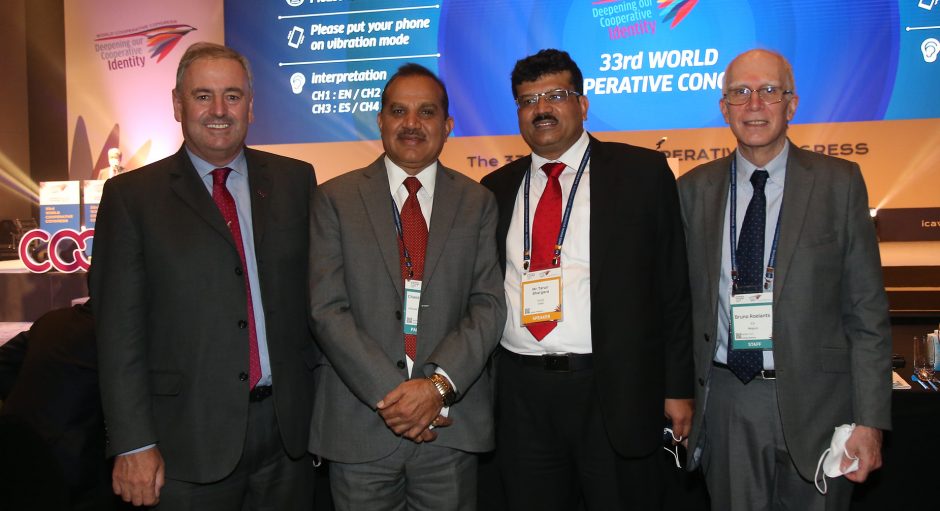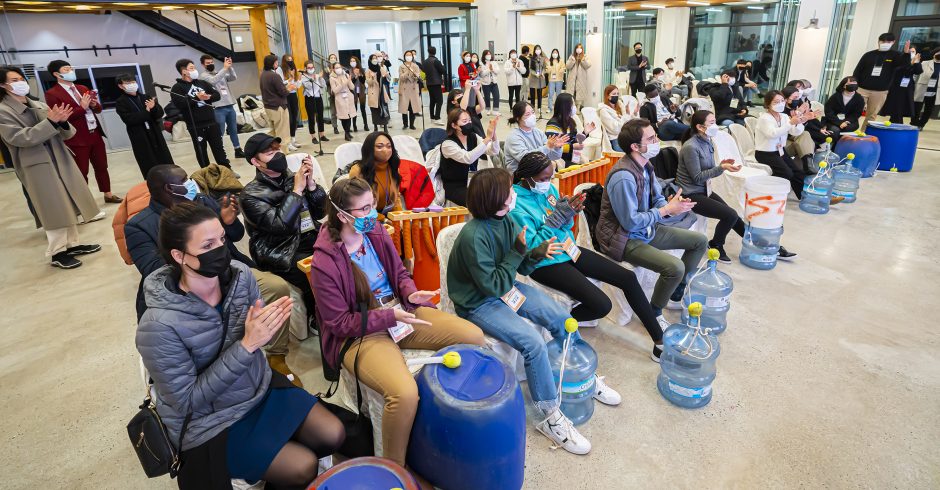CICOPA launches CICOPA Asia-Pacific regional network
CICOPA – the International Organisation of Industrial and Service Cooperatives – launched a regional network for the Asia-Pacific region, to explore the common identity, exchange information, create synergies and strengthen the development of industrial and service co-operatives. At the launch, co-hosted by CICOPA and Japan Worker Co-operatives Union (JWCU), delegates heard how industrial and service co-operatives contribute to decent work, social services, community development, entrepreneurial innovation and economic and societal democracy. Because of this, governments across the Asia-Pacific region are starting to develop favourable public policies.
“We believe exchange and inter-co-operation among industrial and service co-operatives in the region will lead to the promotion of decent work through the development and creation of new co-ops,” said Iñigo Albizuri, President of CICOPA.
According to Balu Iyer, regional director of ICA Asia and Pacific, “the service sector is growing in the region” and will have to tackle important challenges, such as inequalities, migration from rural to urban areas and demographic changes.
How do co-operative banks contribute to and report on sustainable development?
Delegates were presented a report from the International Co-operative Banking Association (ICBA), which looked at how its 50 members worldwide contribute to and report on sustainable development. The study examined the banks’ annual and financial reports, websites and available information in the ICA database, and examined 500 publications from co-operatives on the SDGs and sustainability.
Although there was an issue of limited data, the report found that ICBA members contribute to the SDGs in a number of ways, including social, economic, environmental, institutional and co-operative.

ICA Asia and Pacific (ICA-AP) elects new president
The 15th ICA-AP Regional Assembly met on 30 November to discuss opportunities in the region and to hold elections to the regional board. Dr Chandrapal Singh Yadav was elected president, with Cai Zhenhong (ACFSMC, China) and Dato Dr Abdul Fattah Abdullah (ANGKASA, Malaysia) joining him as vice presidents.
“I thank all my fellow co-operators for their unflinching support and co-operation,” said Dr Yadav, following the results. “I am looking forward to working with you all to realise my 10-point vision into reality.”
Speaking about this vision before the election, he said: “I will work towards encouraging more countries from the Asia and Pacific region to join as members of ICA-AP. I will ensure the expression of the democratic character and autonomy of the co-operative movement. I will work tirelessly to expand education and training initiatives across the region, and build a roadmap for innovation.”
Dr Yadav is a member of the Upper House of Indian Parliament (Rajya Sabha) and chair of Krishak Bharati Cooperative Ltd. (KRIBHCO) and its subsidiaries. He is also president of NCUI, the apex institution of the co-operative movement in India, and sits on the boards of the International Raiffeisen Union (IRU, Germany), the National Cooperative Consumers’ Federation of India (NCCF) and the National Agricultural Cooperative Marketing Federation (NAFED), among others.
Global Co-operative Impact Fund receives European Commission funding
Access to finance has been a longstanding barrier to co-operative growth; the Global Cooperative Impact Fund – run by co-operatives for co-operatives – hopes to help address this.
First suggested in 2012, there has been careful focus during preparation and structuring of the fund to make it a ‘real co-operative fund from A-Z’, fund manager Bruno Dunkel (director at Inpulse, Belgium) told delegates.
“We want – at every moment, at every stage of the development and implementation of the fund – to be true to the co-operative DNA,” he said, adding that the intention is to promote co-operative ideals and identity, create an enabling environment, and support work towards the UN’s 2030 Sustainable Development Goals.
Crucially, an anchor investor has been found to provide capital shares – the European Commission (EC), which can take initial losses and enjoys high visibility to draw attention to the project. It has allocated €15m to start the fund; other funding comes from the co-operative movement and the initial total size of the fund will be at least US$50m, complemented by contributions from investors such as banks and impact funds.
This money will be directed to co-ops and financial intermediaries in the co-operative arena. The initial focus will be on sub-Saharan Africa – a condition set by the EC – but the geographical focus will expand as the fund grows. Funds granted to co-operatives will range from a minimum of US$300k to a maximum of $3m.
Promoting the co-operative identity in the G20
With Indonesia taking over the presidency of the G20, Italian co-operators met with their Indonesian counterparts to hand over the presidency of the ICA G20 Working Group.
Established earlier in 2021, the Working Group has been collaborating with the Italian Cooperative Alliance to contribute to the G20 discussions under the current G20 Italian presidency, particularly involving the Business 20 (B20) and Civil Society 20 (C20) task forces.
As a result of joint efforts and active participation in the different debates, the G20 policy recommendations have recognised co-operatives’ contribution to building up a sustainable future for all, mentioning them five times in the C20 and twice in B20 policy packages.
The meeting was attended by Giuseppe Guerini, vice-chair of the ICA G20 WG and president of CECOP-CICOPA Europe; Danila Curcio, head of International Institutional Relations at Confcooperative, Italy, and facilitator of the ICA’s C20 Working Group; Stefania Marcone, chief of the International Relations and European Policies Legacoop (Alliance of Italian Cooperatives) and facilitator of the ICA’s B20 Working Group, Italy; and Robby Tulus, a pioneer of the credit union movement in Indonesia.
Mr Guerini highlighted the important relationship built with civil society organisations via the involvement of Italian co-operators in the C20.
“The C20 works with civil society organisations so we have built a good bridge into civil society, business and government. We are people, enterprises and part of governance so it is a very good occasion to promise with Indonesian colleagues this heritage that we are ready to pass on,” he said.

Global youth launch co-op toolkit in South Korea’s Co-operative City’
Before Congress, over 50 young people from 13 different countries met in Chuncheon, a city northeast of Seoul, for a three-day workshop organised by the ICA Global Youth Network, in collaboration with Korean hosts, Coop Pan. The event was opened by Chuncheon mayor, Lee Jae-soo. “It is no coincidence that you are here,” he told delegates, explaining that in the Republic of Korea, Chuncheon is known as the ‘Co-operative City’.
The ICA Youth Network launched Cooperative Spring, a youth toolkit, which features case studies of successful youth co-ops. The workshop also included updates from the winners of the #CoopYouth Replication Project, who answered questions about their business model.
Participants heard about local co-ops including KYSC, the Youth Cooperative Federation of Korea, and toured three local Korean co-operatives: JUMO Cooperative, Around the World on Two Wheels Social Cooperative, and Gangwon Forest Cooperative.

